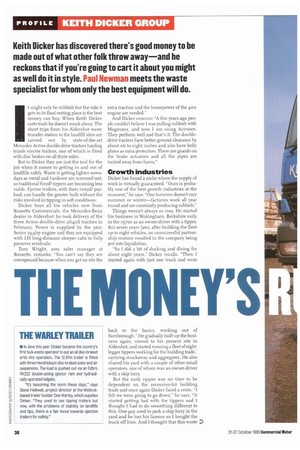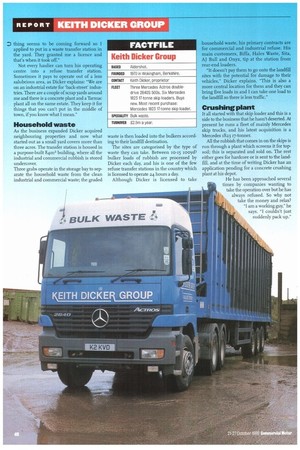PROFILE
Page 40

Page 42

If you've noticed an error in this article please click here to report it so we can fix it.
KEITH DICKER GROUP Keith Dicker has discovered there's good money to be made out of what other folk throw away—and he reckons that if you're going to cart it about you might as well do it in style. Paul Newman meets the waste specialist for whom only the best equipment will do.
t might only be rubbish but the ride it gets to its final resting place is the best money can buy. When Keith Dicker carts trash he doesn't muck about. The short trips from his Aldershot waste transfer station to the landfill sites are carried out by state-of-the-art Mercedes Actros double-drive tractors hauling triaxle ejector trailers, one of which is fitted with disc brakes on all three axles.
But to Dicker they are just the tool for the job when it comes to getting in and out of landfills safely. Waste is getting lighter nowadays as metal and hardcore are screened out, so traditional 6 oyd3 tippers are becoming less viable. Ejector trailers, with their iooyd3 payload, can handle the greater bulk without the risks involved in tipping in soft conditions.
Dicker buys all his vehicles new from Rossetts Commercials, the Mercedes-Benz dealer in Aldershot: he took delivery of the three Ac-tros double-drive 264oS tractors in February. Power is supplied by the 5ooSeries 394hp engine and they are equipped with LH long-distance sleeper cabs to help preserve residuals.
Tony Wright, area sales manager at Rossetts, remarks: "You can't say they are overspecced because when you get on site the extra traction and the horsepower of the 400 engine are needed."
And Dicker concurs: "A few years ago people couldn't believe I was pulling rubbish with Magnums, and now I am using Actroses. They perform well and that's it. The doubledrive tractors have better ground clearance by about six to eight inches and also have belly plates as extra protection. There are guards on the brake actuators and all the pipes are tucked away from harm."
Growth industries
Dicker has found a niche where the supply of work is virtually guaranteed. "Ours is probably one of the best growth industries at the moment," he says. Our turnover doesn't vary summer or winter—factories work all year round and are constantly producing rubbish."
Things weren't always so rosy. He started his business in Wokingham. Berkshire early in the197os as an owner-driver with a tipper. But seven years later, after building the fleet up to eight vehicles, an unsuccessful partnership venture resulted in the company being put into liquidation.
"So I did a bit of ducking and diving for about eight years," Dicker recalls. "Then I started again with just one truck and went back to the basics, working out of Farnborough." He gradually built up the business again, moved to his present site in Aldershot, and started running a fleet of ei legger tippers working for the building trade,' carrying muckaway and aggregates. He also shared his yard with a couple of other small operators, one of whom was an owner-driver with a skip lorry.
But the early 1990s was no time to be dependent on the recession-hit building trade and once again Dicker faced a crisis. "I felt we were going to go down," he says. "It started getting bad with the tippers and I thought I had to do something different to this. One guy used to park a skip lorry in the yard and he lost his licence so I bought the truck off him. And thought that this waste 0 thing seems to be coming forward so I applied to put in a waste transfer station in the yard. They granted me a licence and that's when it took off" Not every haulier can turn his operating centre into a refuse transfer station. Sometimes it pays to operate out of a less salubrious area, as Dicker explains: "We are on an industrial estate for 'back-street industries. There are a couple of scrap yards around me and there is a concrete plant and a Tarmac plant all on the same estate. They keep it for things that you can't put in the middle of town, if you know what I mean."
Household waste
As the business expanded Dicker acquired neighbouring properties and now what started out as a small yard covers more than three acres. The transfer station is housed in a purpose-built 84m2 building, where all the industrial and commercial rubbish is stored undercover.
Three grabs operate in the storage bay to separate the household waste from the clean industrial and commercial waste; the graded waste is then loaded into the bulkers according to their landfill destination.
The sites are categorised by the type of waste they can take. Between 10-15 rooyd3 bulker loads of rubbish are processed by Dicker each day, and his is one of the few refuse transfer stations in the country which is licensed to operate 2,4 hours a day.
Although Dicker is licensed to take household waste, his primary contracts are for commercial and industrial refuse. His main customers, Biffa, Hales Waste, Sita, AJ Bull and Onyx, tip at the station from rear-end loaders.
"It doesn't pay them to go onto the landfill sites with the potential for damage to their vehicles," Dicker explains. "This is also a more central location for them arid they can bring five loads in and I can take one load to the landfill so there is less traffic."
Crushing plant
It all started with that skip loader and this is a side to the business that he hasn't deserted. At present he runs a fleet of mainly Mercedes skip trucks, and his latest acquisition is a Mercedes 1823 17-tormer.
All the rubbish that comes in on the skips is run through a plant which screens it for topsoil; this is separated and sold on. The rest either goes for hardcore or is sent to the landfill, and at the time of writing Dicker has an application pending for a concrete crushing plant at his depot.
He has been approached several times by companies wanting to take the operation over but he has always refused. So why not take the money and relax? "I am a worldng guy," he says. "I couldn't just suddenly pack up."
THE WARLEY TRAILER
• In June this year Dicker became the country's first bulk waste operator to put an all disc-braked artic into operation. The 12.97m trailer is fitted with three Hendrickson disc-braked axles and air suspension. The load is pushed out via an Edbro RK222 double-acting ejector ram and hydraulically operated tailgate.
"Ws becoming the norm these days," says Steve Helliwell, project director at the Matlockbased trailer builder Dee Warley, which supplies Dicker. "They used to use tipping trailers but now, with the problems of stability on landfills and tips, there is a Fair move towards ejection trailers for safety."
FACTFILE Keith Dicker Group
BASED Aldershot.
FOUNDED 1970 in Wokingham, Berkshire.
CONTACT Keith Dicker, proprietor FLEET Three Mercedes Actros double
drive 2640S 500s. Six Mercedes 1823 17-tonne skip loaders. Buys new. Most recent purchase: Mercedes 1823 17-tonne skip loader.
SPECIALITY Bulk waste.
1URNOVER £2.5m a year.












































































































